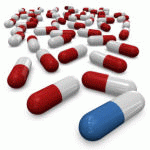Pharmacology
|
14 november 2019 13:00:10 |
| Marine Drugs, Vol. 17, Pages 641: A Microbiological, Toxicological, and Biochemical Study of the Effects of Fucoxanthin, a Marine Carotenoid, on Mycobacterium tuberculosis and the Enzymes Implicated in Its Cell Wall: A Link Between Mycobacterial Infection and Autoimmune Diseases (Marine Drugs) |
|
Tweet This study explored the antitubercular properties of fucoxanthin, a marine carotenoid, against clinical isolates of Mycobacterium tuberculosis (Mtb). Two vital enzymes involved in Mtb cell wall biosynthesis, UDP-galactopyranose mutase (UGM) and arylamine-N-acetyltransferase (TBNAT), were selected as drug targets to reveal the mechanism underlying the antitubercular effect of fucoxanthin. The obtained results showed that fucoxanthin showed a clear bacteriostatic action against the all Mtb strains tested, with minimum inhibitory concentrations (MIC) ranging from 2.8 to 4.1 µM, along with a good degree of selectivity index (ranging from 6.1 to 8.9) based on cellular toxicity evaluation compared with standard drug isoniazid (INH). The potent inhibitory actions of fucoxanthin and standard uridine-5’-diphosphate against UGM were recorded to be 98.2% and 99.2%, respectively. TBNAT was potently inactivated by fucoxanthin (half maximal inhibitory concentration (IC50) = 4.8 µM; 99.1% inhibition) as compared to INH (IC50 = 5.9 µM; 97.4% inhibition). Further, molecular docking approaches were achieved to endorse and rationalize the biological findings along with envisaging structure-activity relationships. Since the clinical evidence of the last decade has confirmed the correlation between bacterial infections and autoimmune diseases, in this study we have discussed the linkage between infection with Mtb and autoimmune diseases based on previous clinical observations and animal studies. In conclusion, we propose that fucoxanthin could demonstrate great therapeutic value for the treatment of tuberculosis by acting on multiple targets through a bacteriostatic effect as well as by inhibiting UGM and TBNAT. Such outcomes may lead to avoiding or decreasing the susceptibility to autoimmune diseases associated with Mtb infection in a genetically susceptible host. |
| 219 viewsCategory: Biochemistry, Molecular Biology, Pharmacology |
 Marine Drugs, Vol. 17, Pages 642: Preparation of Antioxidant Peptide by Microwave- Assisted Hydrolysis of Collagen and Its Protective Effect Against H2O2-Induced Damage of RAW264.7 Cells (Marine Drugs) Marine Drugs, Vol. 17, Pages 642: Preparation of Antioxidant Peptide by Microwave- Assisted Hydrolysis of Collagen and Its Protective Effect Against H2O2-Induced Damage of RAW264.7 Cells (Marine Drugs)Marine Drugs, Vol. 17, Pages 644: Thuwalallenes A-E and Thuwalenynes A-C: New C15 Acetogenins with Anti-Inflammatory Activity from a Saudi Arabian Red Sea Laurencia sp. (Marine Drugs) 
|
| blog comments powered by Disqus |
MyJournals.org
The latest issues of all your favorite science journals on one page
The latest issues of all your favorite science journals on one page



